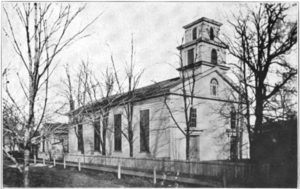George Bennett (Wisconsin politician) facts for kids
Quick facts for kids
George Bennett
|
|
|---|---|
| Member of the Wisconsin Senate from the 8th district |
|
| In office January 2, 1860 – January 6, 1862 |
|
| Preceded by | Samuel R. McClellan |
| Succeeded by | Herman Thorp |
| Member of the Wisconsin State Assembly from the Kenosha 1st district |
|
| In office January 3, 1859 – January 2, 1860 |
|
| Preceded by | Frederick S. Lovell |
| Succeeded by | Meredith Howland |
| Member of the Kenosha City Council | |
| In office April 5, 1850 – April 1851 |
|
| Personal details | |
| Born | 1810 |
| Died | 1888 (aged 77–78) |
| Resting place | Green Ridge Cemetery, Kenosha, Wisconsin |
| Political party | Republican |
| Spouses |
|
George Bennett (1810–1888) was an important American businessman and one of the first settlers in Kenosha, Wisconsin. He served in the Wisconsin State Assembly in 1859. He was also a member of the Wisconsin State Senate from 1860 to 1861.
Starting a New Life Out West
In the winter of 1834-1835, George Bennett helped start a group called the "Western Emigration Company." This group was formed in Oswego County, New York. Its goal was to plan and raise money for their move to the western parts of the United States.
The company's first explorers arrived in Milwaukee. At that time, Milwaukee was part of the Michigan Territory. Soon after, it became part of the new Wisconsin Territory. The group thought about settling in Milwaukee. However, they could not agree with the people already living there.
So, they moved south to the Root River. This area was also already settled by others. This settlement would later become Racine, Wisconsin. They almost joined this community. But the existing settlers did not accept them.
The group kept moving south. They finally found a place to settle at the mouth of the Pike River. They named their new settlement "Pike Creek." In 1837, the name changed to "Southport." Finally, in 1850, it became Kenosha, Wisconsin.
George Bennett's Public Service
In June 1838, George Bennett was one of the first members of the First Congregational Church in Southport. He was also on the church's first board of trustees. Later, he became a Deacon at the church. He also helped start the Kenosha County Bible Society and served as its treasurer.
The Village of Southport became an official village in 1841. In 1842, George Bennett was chosen to be a trustee on the village council. On April 5, 1850, Southport became the City of Kenosha. Bennett was an Alderman on the first Kenosha City Council. He also served as a Justice of the Peace.
Bennett also started one of the first stores in the settlement. He partnered with William Bullen and Beach G. Spencer. They sold supplies that came from New York by ship. Later, he also had a business with William B. Sellick called Bennett & Sellick.
In politics, Bennett helped start the Kenosha branch of the abolitionist Liberty Party. This party wanted to end slavery. The Liberty Party was very important in the Kenosha-Racine area. This area later became a strong supporter of the Free Soil Party. Eventually, it became a key area for the Republican Party.
In 1858, George Bennett was elected to represent Kenosha in the Wisconsin State Assembly. He served during the 1859 session. The next year, he was elected to the Wisconsin State Senate. He represented all of Kenosha County from 1860 to 1861. In the Senate, he worked on a committee that helped build roads and canals. He also pushed for improving Kenosha's harbor and building a lighthouse.
When the American Civil War began with the attack on Fort Sumter, a meeting was held in Kenosha. This was on April 17, 1861. George Bennett spoke at this meeting. He encouraged everyone to support the Union (the northern states). He also gave a lot of money to help fund and equip Wisconsin volunteer soldiers.
After the Civil War, Bennett moved to Ontario, Illinois. He continued his work as a merchant there.
Family Life
George Bennett's first wife, Maria, passed away. Later, he married Julia. Julia was the widow of William Bullen.
 | William L. Dawson |
 | W. E. B. Du Bois |
 | Harry Belafonte |


